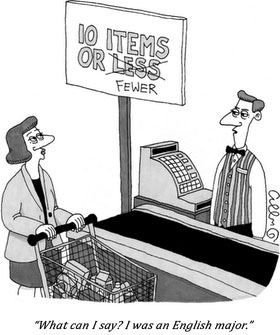|
Up until the late eighteenth century, Brits spoke with an American accent.
So says the noted language scholar Patricia T. O’Conner.
The “English” accent as we know it didn’t develop until the late 1700s. That’s when British snobs started doing things like dropping r’s, adding and subtracting h’s, saying “pahst” instead of “past,” and “sec-ra-tree” and “mill-a-tree” instead of secretary and military. Before that, the English said most words the way Americans did.
When this faddish new way of speaking swept Britain, a lot of people over there, including prominent linguists, decried it.
So much for all those claims that Americans corrupted the English language. In 1770, a British customs official called American English “perfectly uniform, and unadulterated.” An Englishman visiting a few years later wrote, “They in general speak better English than
the English do.”
So begins a breezy, fascinating, sometimes exasperating book that will leave a lot of self-styled language mavens muttering to themselves.
Origins of the Specious, written by O’Conner with her husband, Stewart Kellerman, takes an impeccably researched look at our language’s snares and, in the
process, challenges the validity of some of the most persistent misconceptions about English.
Origins even makes a case for the ignoble double negative. I didn’t see nothing would be correct in French, Russian, and several other languages, and used to be OK in English, too. It still is in special cases: I can’t not buy those shoes.
Did you know? …
• In the fourteenth century, a girl was a child of either
sex.
• Thomas Jefferson gave the world belittle, public relations, and pedicure. Abraham Lincoln was the
source of relocate. Theodore Roosevelt introduced lunatic fringe. Franklin D. Roosevelt coined cheerleader.
• Julius Caesar was not born by caesarian section.
• The plural of octopus is not octopi; it’s octopuses.
• The word ain’t “was routinely used by the upper classes … in the seventeenth, eighteenth, and nineteenth centuries. The word, or variations of it, can be found in the letters and diaries of Swift, Lamb, Byron, Tennyson, and Henry Adams.”
Origins takes a bold stand on “facts” that are sacred to traditionalists. O’Conner makes a convincing case that forte (meaning one’s specialty) can be pronounced “for-tay,” which is a controversial position, to say the least. Diligent speakers make a point of pronouncing it “fort,” especially since the musical term forte (loudly) is already pronounced “for-tay.”
The author’s claim that media can be singular or plural is unacceptable and offensive to many sticklers—not just because the word is the plural of medium, but because it’s important that people think of “the media” as many voices, opinions, and perspectives, rather than one monolithic entity.
And nitpickers will squirm at O’Conner’s defense of ignorant or careless pronunciations like “flassid” for flaccid (should be “flaxid”) or “neesh” for niche (“nitch”). That’s why purists are so crabby, because ultimately, “correctness is determined by common practice,” and “democracy can be exasperating when you’re on the losing side.”
—a book report by our late writer and editor Tom Stern
|
View and comment on this
article on our website.
|
|
Free BONUS Quiz for You!
[[firstname]], because you are a subscriber to the newsletter, you get access to one of the Subscribers-Only Quizzes. Click here to take a Who vs. Whom Quiz and get your scores and explanations instantly!
We will be adding many more quizzes this year to our already substantial list of quizzes. If you have suggestions for topics we have not yet covered, please send us a message at help@grammarbook.com.
|
Hundreds of Additional Quizzes
at Your Fingertips
Subscribe now to receive hundreds of additional English usage quizzes not found anywhere else!
Teachers and Employers
Save hours of valuable time! You may assign quizzes to your students and employees and have their scores tallied, organized, and reported to you! Let GrammarBook.com take the hassle out of teaching English!
"Fun to test my skills."
"The explanations really help ... thanks!"
"I can select the quizzes to assign to my students, and then the results are reported to me automatically!"
|

|
Don't need all the quizzes?
You can now purchase the same quizzes individually for ONLY 99¢ each.
Purchase yours here. |
If you think you have found an error in a quiz, please email us at help@grammarbook.com
|
 |
The Blue Book of Grammar and Punctuation
by Jane Straus, Lester Kaufman, and Tom Stern |
The Authority on English Grammar! Eleventh Edition Now Available
An indispensable tool for busy professionals, teachers, students, homeschool families, editors, writers, and proofreaders.
Available in print AND as an e-Book! Over 2,000 copies are purchased every month!
The publisher of The Blue Book, Jossey-Bass, A Wiley brand, is offering a 35 percent discount for those of you who order the book through Wiley.com. Shipping and tax are not included. Simply go to bit.ly/1996hkA and use discount code E9X4A.
Offer expires December 31, 2020.
|
Wordplay

|
 |
English In A Snap:
68 One-Minute English Usage Videos FREE |
Learn all about who and whom, affect and effect, subjects and verbs, adjectives and adverbs, commas, semicolons, quotation marks, and much more by just sitting back and enjoying these easy-to-follow lessons. Tell your colleagues (and boss), children, teachers, and friends. Click here to watch.
|
|





